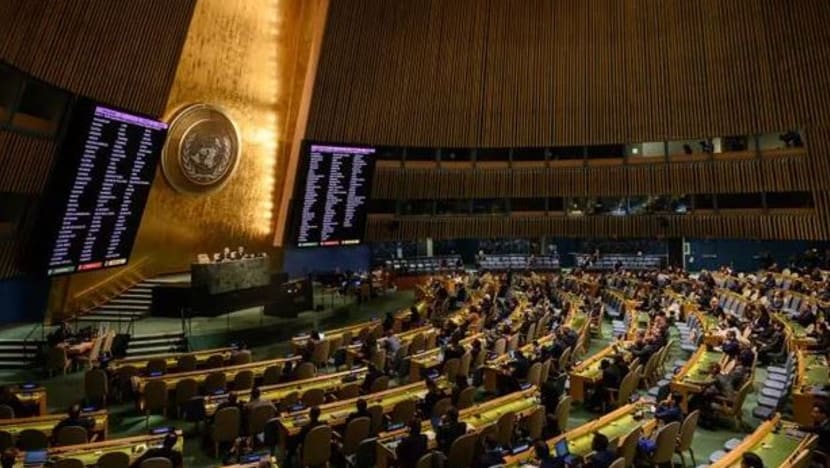This resolution, which was approved by the request of several Arab countries and with 97 votes in favor, 26 votes against, and 53 abstentions in the UN General Assembly, will pave the way for the approval of another resolution in the Security Council. If the International Court of Justice, which is considered a subsidiary of the Hague Court, announces its definitive opinion regarding the illegal actions of the Zionist regime to Judaize Beit-ul Moqaddas, the resolution of the General Assembly will be referred to the Security Council for examination.
Although this resolution does not have an executive aspect, it has been approved in response to the formation of the extremist cabinet of the Zionist regime led by Benjamin Netanyahu. According to the international laws, the International Court of Justice, after reviewing the legal experts and matching this resolution with Security Council Resolutions 181 and 242 regarding the conditions and status of the occupied lands and the geographical area of Palestine after the June 1967 war, will give its advisory opinion to the General Assembly of the United Nations.
Predictions are that the International Court of Justice will interpret the Judaization of Beit-ul Moqaddas is against Resolutions 181 and 242, and in this case, it will leave the hand of the General Assembly free to refer this resolution to the Security Council. But the main problem is that if the Security Council wants to approve a draft resolution condemning the Judaization of Beit-ul Moqaddas and the exclusion of Palestinians from East Beit-ul Moqaddas, the US, UK, and France will veto this possible resolution.
The General Assembly of the United Nations, which is made up of 192 member countries of this international organization, approves resolutions on global issues in its periodic meetings, but these resolutions have only a credit aspect and lack executive leverage. This means that each of the 5 powers with veto rights, i.e. the US, UK, France, China, and Russia, can veto resolutions based on their approaches and interests, and this is one of the major problems of the United Nations. If the powers of the Security Council are handed over to the General Assembly, the conditions of the region and the world will definitely change, and the 5 countries with veto power will not be able to draw the policies of the Security Council based on their interests.
During the past 7 decades, since the establishment of the Zionist regime in 1948, the US, UK, and France, as the main supporters of this regime, have vetoed 85 anti-Israeli resolutions. However, due to the formation of Benjamin Netanyahu’s extremist cabinet, which includes 5 ministers who are members of the Zionist extremist party, most of European countries and even the United States do not have a favorable opinion of this cabinet.
The recent resolution of the UN General Assembly is actually considered a serious warning to Netanyahu’s new cabinet; Because the “Itamar Bin Ghafir” transgression by the Minister of Internal Security of the Zionist regime on Al-Aqsa Mosque has aroused the feelings of the Islamic and Arab nations against Israel and the supporters of this regime.
The more the violent behavior of the members of the Zionist regime against the holy places and the defenseless people of Palestine escalates, it will definitely lead to a sharp reaction from the Muslim nations of the world. The results of the reports show that the United States and some European countries have warned Israel’s Prime Minister Benjamin Netanyahu about the extremist behavior of the ministers affiliated with the extremist religious Zionist party.
After the transgression by the Minister of Internal Security and some extremist Jews at the Al-Aqsa Mosque, the spokesperson of the US State Department expressed concern of the US about the behavior of the extremist ministers of the Israeli cabinet in insulting the religious places of the Palestinians. Therefore, the speculations are that the new Israeli cabinet, which was formed through the coalition of the Likud party led by Netanyahu with religious and extreme right-wing parties, will not last long and this coalition will collapse. The reason for this is that Benjamin Netanyahu will lose his regional and international support due to the extreme and unacceptable behavior of religious party leaders and will have to face another early election.










0 Comments